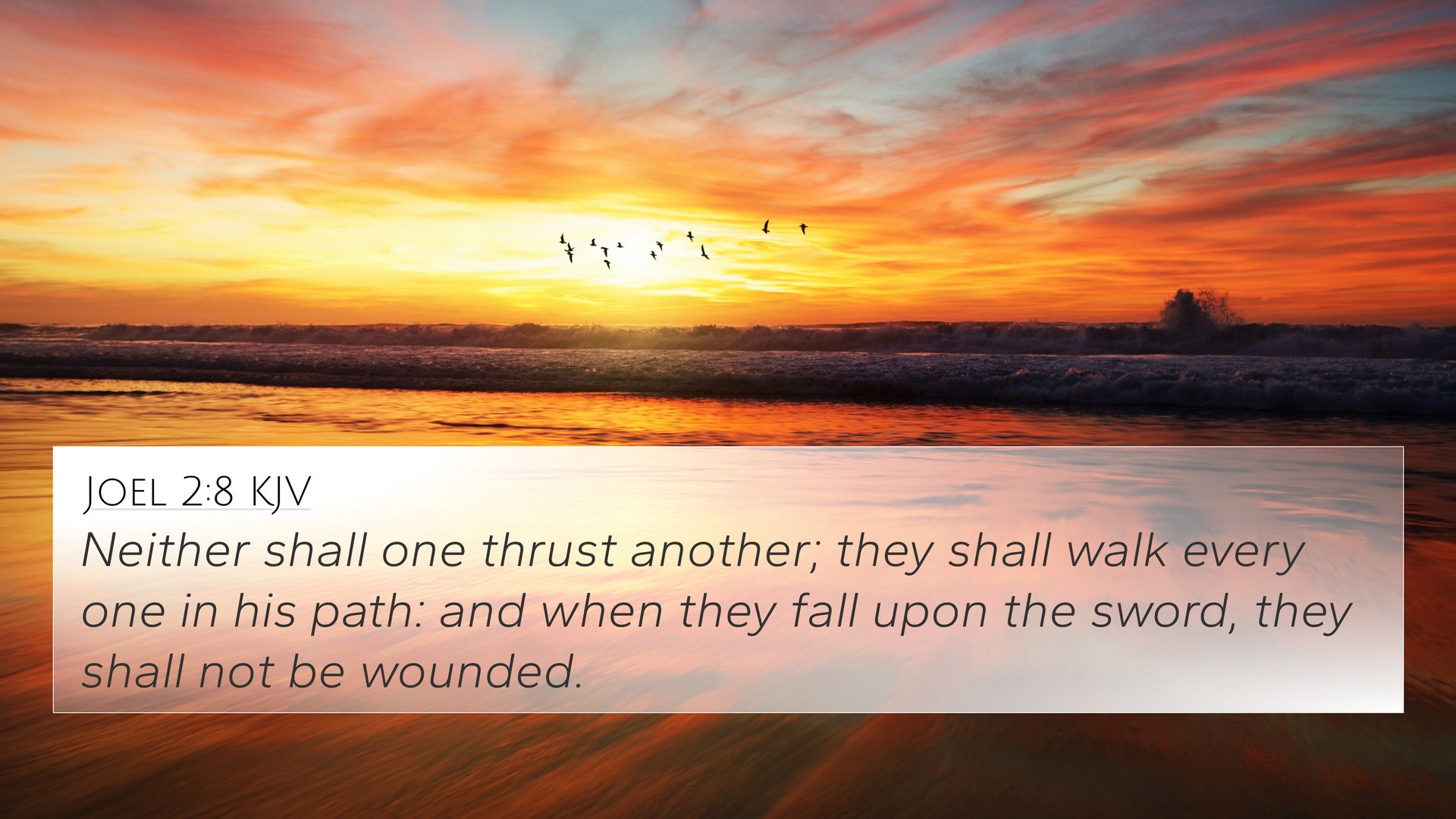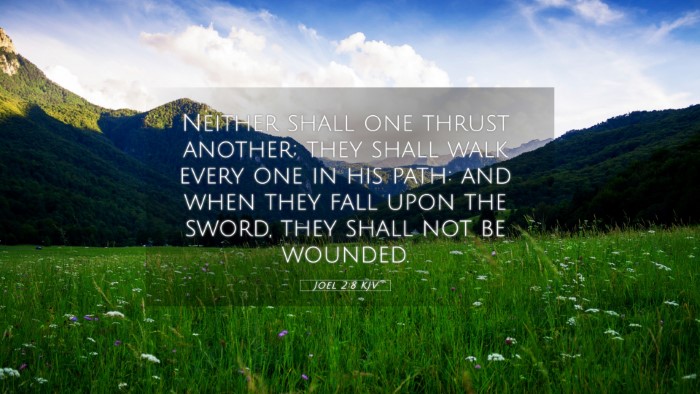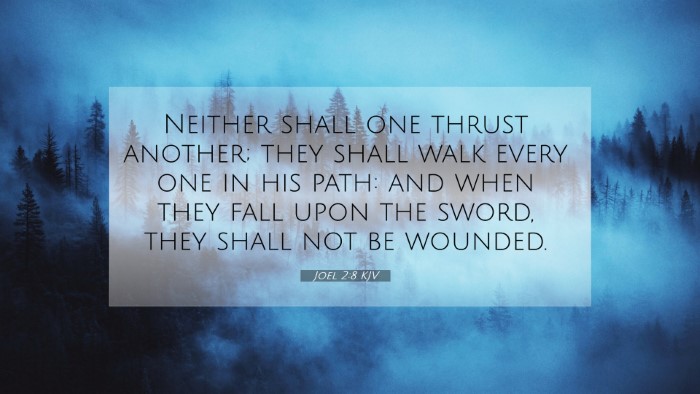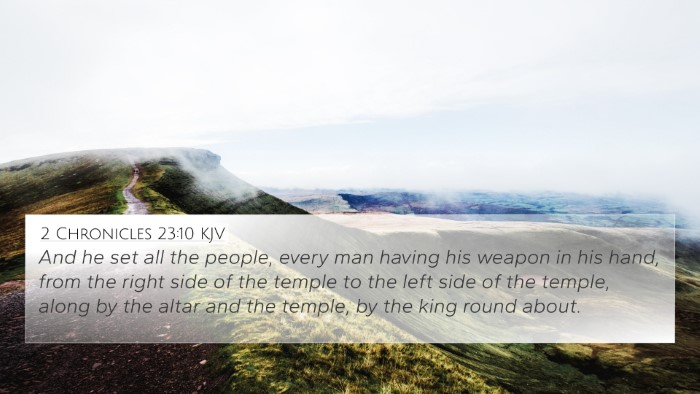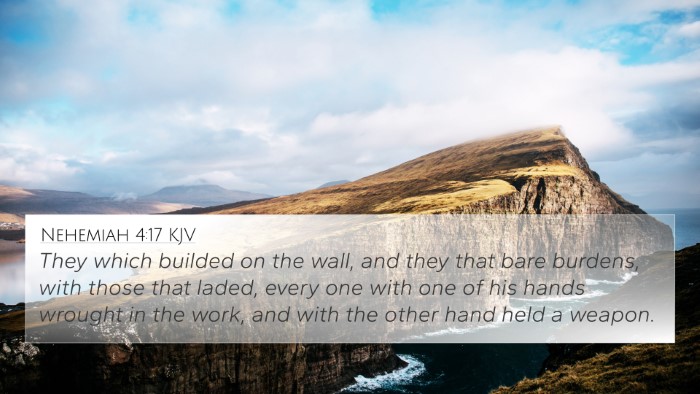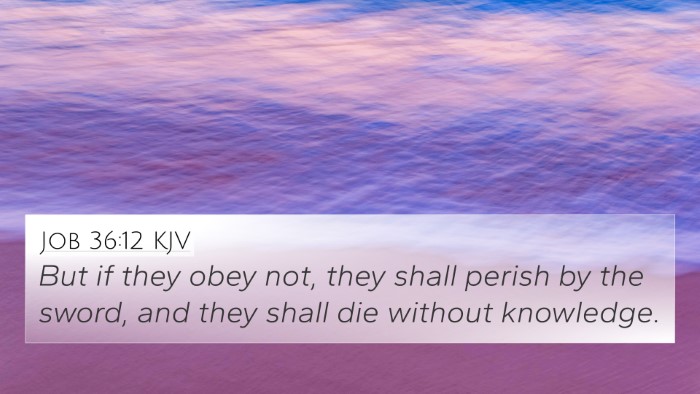Understanding Joel 2:8
Joel 2:8 states: "They do not jostle one another; every man marches in his own column. Though they fall among the weapons, they are not hurt."
This verse describes the disciplined and organized approach of invading forces, symbolic of God's judgment and the inner workings of His plan. To gain a comprehensive understanding, we will delve into the insights from various public domain commentaries, linking to wider Biblical themes and cross-referencing relevant scriptures.
Verse Meaning and Commentary Insights
Overview of the Commentary Insights
-
Matthew Henry:
Henry highlights the orderly and fearsome nature of the invading army, drawing parallels with God’s judgment that is often executed in a methodical manner. He notes that the imagery represents not just physical invasion, but also a spiritual awakening and accountability.
-
Albert Barnes:
Barnes emphasizes the unity and strength of the forces as they march together without confusion. This reflects the precision and power of God's judgment as it sweeps across nations. He interprets the unscathed nature of the troops amid chaos as indicative of God's protection over His people.
-
Adam Clarke:
Clarke offers insight into the metaphorical significance of the passage, connecting the orderly advance of the forces to the Church's spiritual battles. He suggests that the orderly approach signifies a strong and militant faith that can overcome obstacles, reminding believers of their mission.
Connecting Themes in Scripture
This passage not only stands alone but connects to numerous other Biblical texts that enhance its meaning:
- Psalm 91:7: “A thousand may fall at your side, ten thousand at your right hand, but it will not come near you.” - This emphasizes God's protection akin to the manner in which the troops in Joel are untouched.
- Micah 4:11-12: Relates to the gathering of nations and God’s plan, echoing themes of divine judgment.
- Revelation 9:7: Describes locusts as an army, showcasing parallels between natural disasters and divine judgment.
- Matthew 24:6: “You will hear of wars and rumors of wars...” - indicates the signs of the times, much like the theme of judgment present in Joel.
- Isaiah 59:19: “When the enemy comes in like a flood, the Spirit of the Lord will lift up a standard against him.” - Mirrors God's intervention as depicted in Joel 2:8.
- Hebrews 10:31: “It is a fearful thing to fall into the hands of the living God.” - aligns with the fearsome aspect of God’s judgment present in Joel.
- 2 Corinthians 10:4: “For the weapons of our warfare are not of the flesh but have divine power to destroy strongholds.” - illustrates the spiritual warfare context.
Cross-Referencing the Themes
In studying these passages, readers can explore the following methods for cross-referencing:
- Utilize a Bible concordance to find words and themes that relate back to Joel 2:8.
- Create a personal Bible cross-reference guide to track recurring motifs of unity and judgment across various books.
- Engage in Bible cross-reference study by grouping verses that discuss judgments and collective experiences.
- Read parallel accounts in different Gospels to compare how each author presents the theme of judgment and faith.
Exploring the Meaning of the Verse Through Cross-Reference Tools
Understanding Joel 2:8 can be enriched through the following tools:
- Detailed Bible reference resources that allow you to view themes in context across the Bible Book.
- Cross-reference systems in study Bibles that visually connect similar themes across texts.
- Utilize software or applications that provide cross-reference Bible study methods for deeper analysis.
Conclusion: Interpreting Through Cross-References
As we conclude the analysis of Joel 2:8, it is clear that the verse stands at an intersection of judgment, order amidst chaos, and divine protection. Engaging with its broader context through various Bible verse cross-references creates a tapestry of understanding that adds depth to both personal faith and collective interpretation.
